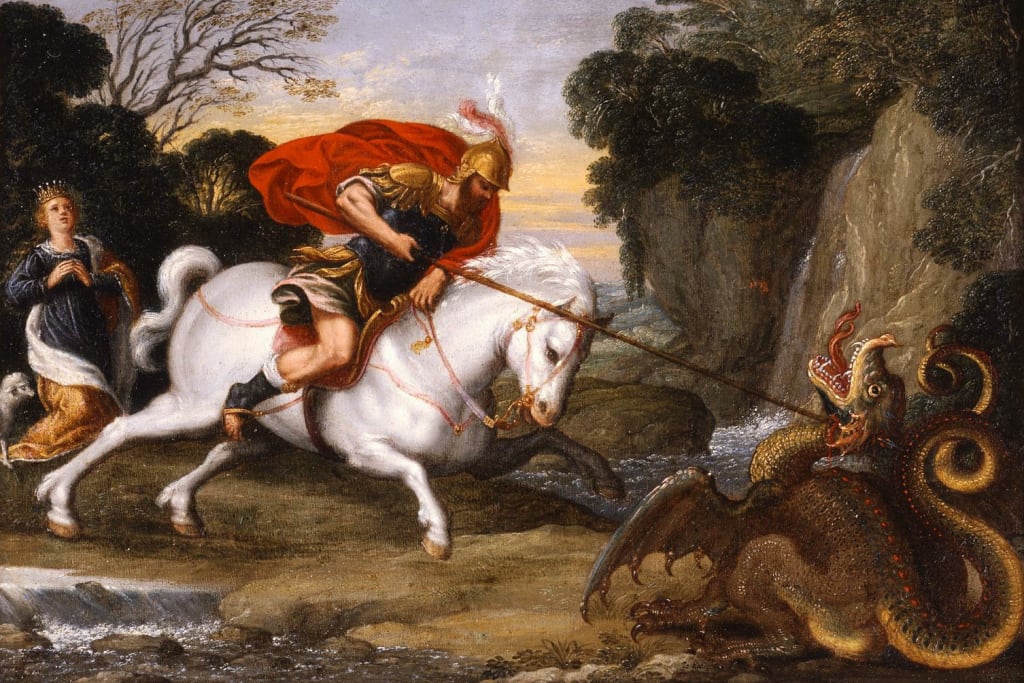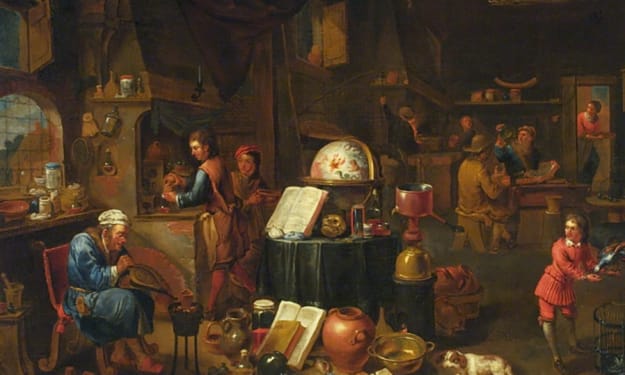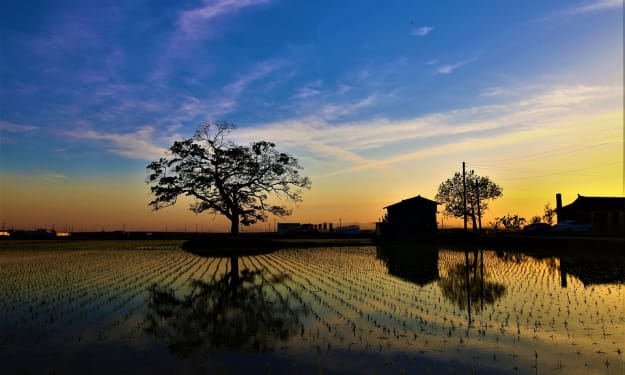The First Stone
Prologue

“There weren’t always dragons in the Valley,” Yulfi whispers to his compeer, eyes alight, as though the flint they struck earlier had ignited more than just the campfire in front of them both.
“But now there are, and they come for the Kings,” comes Heda’s reply; she takes his outstretched hand and is reassured by its firmness, though she can still feel her own bones trembling beneath.
The orange glow of the fire accentuates the roundness of her features, dulling what little edges and lines there are on an already moon-like countenance. Her eyes, totally pitch black, huge, reflect back even more of the flames than Yulfi’s do, making it look with a half-glance as if she has a fire within her own skull, burning, flickering.
Perhaps, to a certain degree, she does. Born with attunement, with the aptitude for magic soaked right into her, to a certain degree the extra laws of the world do have a searing presence inside of her head, something that Yulfi is numb to.
Her smouldering and his numbness is precisely why they are both here however, balancing each other out, fireside by the wall of Castle Brounwithe’s outer bailey, waiting only a few more moments before they both dutifully follow the sinewy, silvery thread that has so been spun for them thus far. Two dragons, unexpected.
-/-
Castle Brounwithe used to be the residence of The Fair Queen. It’s a sprawling, patchwork structure, the oldest castle in The Lands, currently known, of course, as The Fair Lands, for although The Fair Queen does not reside in the castle still, at least not in the sense her subjects wish to acknowledge, she is not dead, so they are hers.
When the castle was first built it was without the aid of magic, and really just a keep: four turrets, stone, wood. The castle was built for the first monarch, The Green King, of the Greenfolk, the only monarch to this day who was named after the land and not the other way round.
Everything truly was green then too, the air, the stones themselves. The Lands had been born from the sun, and in those early days everything the sun produced was green; life knew no other way, the pigment was simply innately connected to being, inextricable.
The Green King was thought to reign forever. His folk were happy, simple, the castle didn’t exist for military means or for defensive purpose, it had just been a project, it felt fitting for those who undertook it, it allowed an elevation for The Green King, for him to survey all four corners of his land as far as his eyes could manage.
Unthinkably though, his eyes got worse, his temperament failed, and when he died so too did something in The Lands, because all at once it was like a very inheld breath had been sighed out, and with the force of all the years it was held in for accumulated, taken all the green away with it.
When The Green King’s body was laid to rest his skin was grey, his hair a tawny colour, his veins stricken purple. He was buried in the brown of the earth, underneath the blue of the sky.
It was after The Green King’s death too that other colours were learnt, bad colours, red, black. There were vast wars about who was to occupy Castle Brounwithe now, there were wars defending the right of other castles that had been covertly erected in the far reaches of The Lands, just beyond the eyeline that standing on any of Brounwithe’s four compass turrets would allow. And there were wars about magic.
Emerging from the vast canopies and dense forests, previously totally camouflaged, the Vernfolk did not submit to the discovery by the Greenfolk.
“We’ve always been here,” they said, “you just weren’t looking.”
“How could you have been greener than even ourselves? How could we not see you?”
“Because. It is not our skin that is green. We are green.”
Blessed by the sun, the Vernfolk have that inextricable link to life that everything else used to. They can see all the rules the sun had played by, the instructions, the components. They know what a tree truly is, what a stone truly is, and (if they concentrate very, very, very closely) even what a beast, what a folk, truly is.
While these sacred rules are audible to all the Vernfolk, and equally while all Vernfolk are able to bend them in that small way so as to camouflage themselves wherever they may be, the rules are not readily there to use. And, truly, it only became evident that some Vernfolk could even use the rules at all when they most had to figure it out, when they waged war with the Greenfolk.
It was a terrible war on top of all the other wars that had already been happening. The Greenfolk demonstrated a unanimous savagery, innovation in metal and stone for the express purpose of making tools that were better equipped for violence, better and better and better. The Lands became the War Lands. They couldn’t not, that’s all they were.
Alongside this, certain Vernfolk, driven by outrage, fury, emerged from the midst of their brethren as not just able to use the rules of the sun to create and utilise certain of the sun’s forces, but also to destroy. Huge swathes of earth were torn asunder, great ravines and valleys that fractured the once-whole War Lands in the tactical aid of the Vernfolk.
So it was said, an even smaller number of the Vernfolk even listened so intently to the rules of the sun they came to know how to undo life itself with a single touch. They would utilise camouflage, the simplest of all Vernfolk magic, and run amok in the battalions of Greenfolk, felling whole armies with the merest of gestures, skin to skin contact, writing the most complex of all rules backwards, taking everything away.
The old adage nonetheless persists, “all is fair in love and war”, and eventually, thankfully, even amidst the true bleakness of the War Lands, Muthilde of the Vernfolk, a lovely, voluptuous lady from the marshes, fell in love with Tider, a willowy Greenfolk from the forest.
Theirs is a unique love story only by virtue of lineage, as of course Vernfolk and Greenfolk of all species and creed had fallen in love across enemy lines at other instances within the War Lands. All folk are only folk after all. But Muthilde was a Princess, and Tider was the current War King.
They married. The first marriage ever. Up until this point there had been no real need for a ceremony between two people in love (who after all may have been equally predisposed to fall out of it at any given moment) but theirs was a love at once pure and political. So a ceremony was invented, widely talked about, symbolic, and so the Married King and the Married Queen came to rule over the Married Lands, and largely the wars ended.
Vernfolk and Greenfolk alike settled into their era of peace. New castles had been erected not only before the war, but during the war, so Castle Brounwithe was no longer the only central point of civilisation - nevertheless there was an easy coexistence between all settlements, even those in the farthest reaches of the Married Lands.
The Married King and Married Queen were gracious in acknowledging the legitimacy of those clans asking for it. Since they had grown and lived so within the guts of the war itself they were both familiar with many of the main players: The Prince of Swamps, the Prince of the Mountains, the Princess of the Plains, the many Princes and Princesses of the Sea and so on.
Acknowledging their legitimacy was no trouble, and neither was working out the ascension to the throne, however, just for posterity's sake, the Married King and Married Queen requested that everything be written down, a record kept, something concrete to refer to.
Though it is often difficult to point out the true catalysts of history, since every event has a preceding event has a preceding decision has a preceding event, there is a fairness in saying that this writing down is the true beginning of the trouble that Yulfi and Heda currently find themselves tangled in. The twirling of a silvery twine between fingers, the threading of the needle.
The practice of writing begot more writing. Royal records, geographies, contracts, stories, and then, one day, purely by accident, more magic, different magic.
The Married King and Married Queen at once ordered a study of this accident. They built a castle specifically for it, way out of the way, at the barrenest part of the long stretching beaches by the end of the Lands.
(As an aside, just out of interest, there is still a lot of greenness when venturing this far out to the Land’s edges. The waters of the Sea that lap at the shore are tinged a slight turquoise, and the sky at night erupts with vast ribbons of light that snake across the atmosphere, undulating green: life is here, it starts here, it ends here, in the sky.)
The overseer of this castle was initially called the Prince of Research. His job, and the job of the castle’s populace, was to intellectually master what had previously been accidental. To understand what it was about that first word that made it magic to write down, and to find out as many others, if any others, of these magic words as they could. Even if it took aeons. Even if it was a never ending task.
The reason the Prince of Research was given such a dogged and isolated posting was because the magic of words was incomprehensible, and incomprehensibly dangerous. It did not concern itself with the rules of the world like the Vernfolk’s magic did, it was instead immaterial, conceptual, some magic of fate.
The poor scholar who had discovered the first magic word had writ it so and then found himself vanished. Subsequent work by the Prince of Research revealed that he had not vanished himself entirely, though he had superseded the laws of the world and instantly teleported himself southwards, very far, whereupon he died an eventual death of exposure.
(Another aside, just out of interest, when this magic was greater understood and made usable, the Prince of Research had the frozen, essentially mummified remains of the aforementioned scholar teleported back to his castle, where they stay to this day as some semi-sacred, semi-historical object.)
It goes without saying that both the Married King and Married Queen were very aware of how potent and destabilising this had the potential to be, which is why they hoped by making the research a charge of their own it would curtail any potential threat. The Prince of Research and his peers would have their curiosity endlessly sated, their minds exercised and fulfilled, far away from any risk, at the end of the Married Lands.
The many, many subsequent Kings and Queens, sometimes alone and sometimes together, understood this and this arrangement too.
For a very long time, decades, generations, it seemed like everything was working. At least in terms of the delicate balance between magic words and life itself. Unavoidably the Lands themselves had seen a handful of skirmishes, some diplomatic, some physical, and the pushing and pulling between the Greenfolk and the Vernfolk did occasionally push and pull as it did over time. But there were no more accidents, no more pickings at the fabric of the universe, even as the historical documentation of everything carried on.
The only notable fluctuation emanating from the castle was that a name eventually settled over it, Castleend, and that the Prince of Research (not the original one, mind, some successor) requested to henceforth just be known as the Head Scribe, with everyone else at Castleend assuming some Scribe title or another depending on their ranking. After so very many years of tireless and productive research this seemed a reasonable enough request to permit.
-/-
So then we come to this, the reign of the Fair Queen over her Fair Lands, and how they have been corrupted by a magic that antithetically isn’t very fair at all.
Word, inevitably, spread throughout the Fair Lands about the strange powers living and breathing in the pages of the Scribes of Castleend. Word had been spreading before in whispers, but never solidifying, always being shouted over by something else. Now though, due to the Fair Queen’s eponymous diplomacy, there wasn’t really much to be shouting about, and so eagerly bated ears now welcomed the whispers, and eagerly gossiping mouths then amplified them.
To some the whispers became fanciful schemes. To fewer still they became detailed plans. And to only one cohort, bitter, twisted and gnarled by all manner of ill-tidings about the past, the present and the future, they became a carried out crime: a pilgrimage to Castleend, a kidnap, and calamity.
There are two elements that must be understood, if the motives for this crime are to be understood.
The first is that while they did not get magic from those early, green days like the Vernfolk did, the Greenfolk did not get nothing from the sun.
The Green King was able to exist as he did because something unspoken passed between the Green Lands and the sun around his existence, something truly too mystical and too deeply entrenched within the material of the land to be properly parsed by any folk.
What that was, was the inability to die, until the Lands themselves bade it to be.
The Green King could be touched by no blade, corrupted by no poison, drowned by no liquid, burned by no flame. He was protected by the will of the land, the will of the people; some respected, intangible interplay between the two.
This protection is hereditary, not entirely by genetics, but also by this willpower.
When the Married King and Married Queen prepared all the logic they possibly could to document the ascension to the throne, in all the various ways they could, the Married Lands listened, obeyed, knew it too would follow these guidelines and grant its almighty shield to whoever was destined to have it.
There is a caveat. Only a Greenfolk can be granted this protection, there has to be a Greenfolk on the throne. The protection extends to Vernfolk only in the instance where they are married to the Greenfolk on the throne at the time, and then as is the way, when it is time, the Lands will bid that they pass on at the exact same moment.
There is a second caveat. As of yet, there is no way of knowing when the Lands will decide to lift their veil, and pass the immortal torch over to whoever is next in line. It just happens. Sometimes after hundreds of years, sometimes only after a few.
As is imaginable, plenty of the skirmishes referenced earlier have been related to this ancient, sacred rite. Trying to understand or manipulate it, trying to trace bloodlines, force marriages, kill opponents who may theoretically be in the way. Indeed it seems that those genetically related to whoever is on the throne at the time are granted some small morsels of power, more robustness, lack of fatigue, aversion to ageing, but never the entire thing, and never, ever, ever enough to usurp the ultimate will of the Lands.
The second thing that is vitally relevant to the kidnap is that the Scribes of Castleend had discovered a way to write into this will themselves.
They call it Green Writing for its close proximity in nature to that original magic of the sun, and because it can only be done in green pigment.
The complexity of Green Writing’s discovery is no use hashing over. The Scribes of Castleend are experts in their science, experts in the exact calligraphic gestures needed to write a magic word and how to specify what it does within the bounds of its own magic, the exact ink, the exact size and font and everything else.
The only thing that matters is that discover it they did.
The only thing that matters is that a Scribe was kidnapped, tortured, and forced to use this discovery to write eight, illegitimate Kings into existence. Which they did, which then became so. Eight, evil kings, protected by the will of the Fair Lands, empowered now to make their Lands as bitter and twisted and gnarled as they saw them to be.
Unthinkably horrible, historical things have been happening ever since. The Fair Lands have been, and continue to be, ravaged. The eight Kings wished to use the Scribe’s power for their own and so desecrated its study; they write terribly illegible magic words that wreak havoc with the world, in multitudinous ways that hardly bear repeating.
In a bid to save what she could The Fair Queen ordered that Castleend retreat into itself, use whatever universe bending words it knew to hide away somewhere safe and secret that the Kings could not discover, that nobody else could access, that no Scribes could be stolen from ever again. She hoped that their research may eventually be the key to saving her Fair Lands, that one day the Head Scribe would write himself back again, a wonderfully penned solution in tow.
In response the eight Kings used their vile, desecrated magic words and created the Valley, less a geography, more of a force, so-called because everything in the Fair Lands now slopes down into it. Crops don’t grow properly, sickness is rife, hope is scarce. Everything is now in the Valley, unable to scramble up its sides, hardly touched by the sun.
Then they captured the Fair Queen and entombed her in the Valley’s epicentre, some dreadful, dank hole in the very depths of the earth.
As long as she is still living, she still has a claim to the Land, and so the Kings are restricted in bringing about their true armageddon, the conversion of the Valley into the Fissure, the true end of the world.
The Kings have been waiting for her to die a very long time.
So too the Fair Lands have been waiting. At least in a broad sense. History tends to deal with broad strokes, as it would be impossible to include all the minutiae in what is meant to be a summary. This isn’t to say that all individual folk have just been in stasis though, of course not, they have been living their lives as much as they can in the Valley of the Kings.
They have been telling stories, rearing livestock, marrying each other, taking naps outside on less-cold days, bartering goods, bickering sometimes, talking, talking, talking. They have been persecuted by the King’s forces, subjected to violence, famine, poverty, insured against worse treatment, fatal treatment, only by virtue of the fact they are still rightfully the Fair Queen’s subjects.
-/-
Within the tangle of hundreds of thousands of folk, sometimes certain conditions are met. Certain predispositions to being a certain way, feeling a certain way about the world as it currently is. Yulfi and Heda are a result of these conditions, the interlinking of multiple instances of these conditions in multiple folk. Like some deeply intricate, beautiful, mathematical equation that is slowly and still undergoing iterations, unknown to the Kings, this secret network of conditions is perhaps the last hope. It slowly spreads itself across the Lands, conditions that spur action, that inspire rebellion, emancipation.
In the stories of old, the Green Stories, the only thing powerful enough to defeat a King (or a Queen) is a dragon.
Nobody knows whether this is actually true, much like nobody knows what a dragon really looked like. The mythos of the dragons has been pieced together based largely off of the size of old bones long buried, discovered way after the time they had belonged to anything fleshy and muscular, dead long before they even had the chance to so much as see a King. For the narrative purposes of the Green Stories though, this isn’t really of any import.
It isn’t of any import for talismanic purposes either. Which is why this is what the secret network of folk decided to dub themselves. If the only thing powerful enough to defeat a King was said to be a dragon, then dragons they would become.
Yulfi is a dragon. Heda is a dragon. And they got to where they are now, huddled and anxious by the outer bailey of Castle Brounwithe, because of the very ravelled cause and effect of many words and many actions of many dragons that have come before them.
“Are you ready?” Yulfi asks Heda, only just now relinquishing his grip on the Vernfolk’s hand. A cold hand, slightly webbed, which alongside her all-black eyes betray her ancestry in the swamps. A cold hand that their plan depends on.
“I think so.” She confirms, she insists, looking back into his set and determined features, so crafted by the mountainous region where his kind hail from; the plan depending on her depending on him.
“Let’s do this then.”
And with that, both Yulfi and Heda move right up to the bailey wall itself. Heda runs her webbed hands over the surface of the stones, reading them, listening to what they’re telling her. She can hear their interconnectedness in the wall, one attached to another attached to another attached to another… Then, a stutter, a gap. There are stones here that are just stones, solitary stones, ready to be loosed by an adept hand.
She nods to Yulfi who makes light work of the situation, prying the loose stones properly loose with his strong arms.
A dragon who they will probably never meet built this untold entryway into Castle Brounwithe, and more dragons still broadcast the significance of its existence, all of this under the very real threat of death. For Castle Brounwithe is the current captive place of the one and only living Scribe in the Fair Lands, the only one who has not been hidden away, the one who has been tortured and used and broken.
Yulfi and Heda are here to utilise the groundwork that has been so carefully and quietly laid preceding them. To get the Scribe out. To free them. To enlist their very vital help in the beginning of the felling of the Kings in the Fair Lands.
And so begin it does. One stone at a time.
About the Creator
Amelia Lane
Trying my best.






Comments
There are no comments for this story
Be the first to respond and start the conversation.